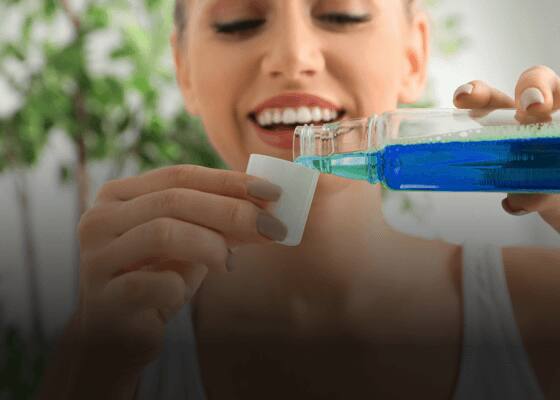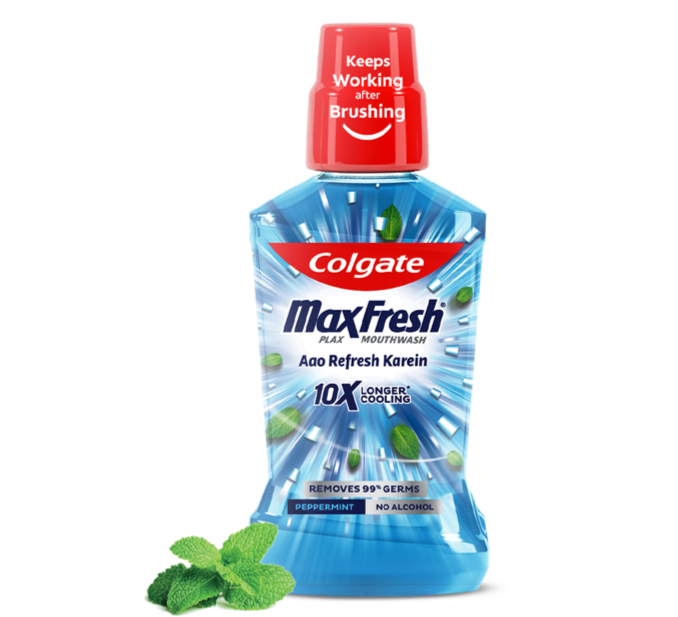What is Mouthwash?
Mouthwash, also known as an oral rinse, is a liquid solution used to rinse the mouth, typically after brushing and flossing. It helps freshen your breath, reduce bacteria, and improve oral hygiene. Mouthwash often contains ingredients like antibacterial agents, fluoride, and other active substances that target specific oral health concerns, such as plaque buildup, gum inflammation, or tooth decay.
While not a replacement for brushing and flossing, mouthwash can offer the benefit of reaching areas that are not otherwise easily accessible. It is often considered an effective way to maintain fresh breath and support your overall oral health. Additionally, it is also helpful for conditions like mouth ulcers and sore throats when used as a gargle.
Types of Mouthwash
Mouthwash comes in various forms, each with its unique function that meets diverse oral health needs. You might be looking to freshen your breath, fight bacteria, or for alcohol-free products, and the good news is there is a mouth rinse for each of them. Below are some common types of mouthwash and how they can benefit your oral hygiene routine.
If you want to enhance your oral care routine, consider trying Colgate Maxfresh Peppermint Fresh Mouthwash. Its alcohol-free formula provides a refreshing start to your day with a powerful burst of freshness. The peppermint flavour delivers a cooling sensation and eliminates 99% of germs, ensuring your mouth stays clean and refreshed.
Fresh Breath Mouthwash
As the name suggests, fresh breath mouthwashes are designed to provide a fresh burst and a temporary solution for bad breath (halitosis). These feel fresh mouthwashes often contain ingredients that mask the unpleasant odours that arise out of your mouth. Also called cosmetic mouthwashes, they typically contain flavours like peppermint and cool mint, leaving your mouth feeling clean and refreshed. However, while they freshen breath, they generally do not contain ingredients to kill the bacteria that cause bad breath, nor do they necessarily help prevent gum disease or caries.
Antibacterial Mouthwash
Antibacterial mouthwashes are designed to target harmful bacteria in your mouth. They usually work by stopping the growth of bacteria or reducing their activity. These mouthwashes can be especially useful if you have gum infections like gingivitis, as they help promote healing. However, using an antibacterial mouthwash does not replace brushing and flossing. While they can support your oral hygiene routine, they do not remove plaque or clean the surfaces of your teeth.
Antiseptic Mouthwash
Antiseptic mouthwash is designed to reduce various types of microorganisms, including bacteria, fungi, and viruses. Its primary goal is to reduce the overall presence of harmful microbes in the mouth, helping to prevent infections and promote overall oral health. The active ingredients in antiseptic mouthwash liquid work by killing or stopping the growth of bacteria that lead to plaque, gingivitis, and bad breath. It helps keep your gums healthy, prevents plaque buildup, and can be beneficial for those with gum disease concerns.
Alcohol Free Mouthwash
Many mouthwashes contain alcohol, often ethanol, which can cause a burning sensation in the mouth. If you experience discomfort or irritation from alcohol-based mouthwashes, switching to an alcohol free mouthwash may be better. The benefits of alcohol free mouthwash are especially notable for people with dry mouth (xerostomia) or those who have reduced saliva flow due to medication or other factors. Additionally, alcohol free mouthwashes are believed to have a gentler effect on dental restorations, like fillings and crowns, helping to preserve their gloss, colour, and hardness better than mouthwashes with alcohol.
Herbal Mouthwash
For those seeking a more natural option, herbal mouthwashes prepared with extracts and essential oils can be a good choice. These mouthwashes offer gentle remedial effects for people with sensitive gums or those who are avoiding synthetic chemicals. Herbal mouthwashes can provide breath-freshening effects and mild antibacterial benefits, making them a popular choice for dental care. They have also exhibited potential benefits in dental plaque and inflammation control.
How to Choose The Right Mouthwash?
With so many types of mouthwash available in India, finding the one that fits your needs can be a bit challenging. If you are unsure about which to choose among the various over-the-counter options, a dentist can guide you in finding the best mouthwash for issues like bad breath, gum disease, or dry mouth. Here are a few things for you to keep in mind when selecting the right mouthwash product:
Purpose: Figuring out why you need mouthwash is really important. The purpose can vary between the reasons, which include freshening breath, reducing plaque that could otherwise harden to tartar, gum inflammation, strengthening teeth, and even reducing tooth sensitivity.
Active Ingredients: Consider the active ingredients present in a mouthwash to understand whether they will suit your specific needs. You may look for ingredients like chlorhexidine to fight bacteria and essential oils like thymol and menthol to freshen your breath. Fluoride mouthwashes can help strengthen your tooth enamel and prevent cavities.
Alcohol Content: Many mouthwashes contain alcohol, which can cause dryness or irritation, especially if you have a sensitive or dry mouth. Alcohol free mouthwashes may be a better option if you are looking to avoid these side effects.
Flavours: Choose a flavour you like. A pleasant taste can make it easier to incorporate mouthwash into your daily routine.
Whether you are seeking help with anti-plaque, fresh breath, teeth whitening, managing mouth ulcers, or any other oral health conditions, choosing the right mouthwash can make a big difference.
How to Use Mouthwash Effectively?
Using mouthwash the right way is important to get the full benefits of it for your dental health. While it may seem straightforward, following the correct steps ensures that you get the maximum benefits from it. Here is how to use mouthwash effectively:
Use as directed: Always follow the usage instructions provided on the product. Some mouthwashes are designed for once-daily use, while others may be safe for multiple uses throughout the day.
Swish for the right duration: Take the mouthwash into your mouth and swish it around the mouth for the duration as provided in the product label. Make sure the liquid reaches all areas of your mouth, including between teeth and around the gums.
Do not swallow: Spit the mouth washing liquid out after swishing. Accidentally swallowing a small amount is usually considered harmless, but try to avoid it.
Wait before eating or drinking: After using mouthwash, avoid eating or drinking for about 30 minutes to allow the active ingredients to work.
Pair with brushing and flossing: Remember, mouthwash is not a replacement for brushing and flossing. Brushing with fluoride toothpaste and a soft-bristled toothbrush twice daily is important, along with flossing.
To conclude, adding the right mouthwash to your dental hygiene routine can significantly support your oral healthcare. Whether you aim to freshen your breath, reduce plaque, or manage gum disease, choosing the right mouthwash can enhance oral care. Remember, mouthwash is a complement, not a substitute, to brushing and flossing. By selecting a product that suits your specific needs and using it correctly, you can take an important step towards maintaining a healthy mouth and improving your long-term dental health. For more personalised advice, consulting your dentist is recommended.
Frequently Asked Questions
Which type of mouthwash is best?
The best mouthwash depends on your specific oral health needs. For fresh breath, choose a cosmetic mouthwash; for fighting bacteria and gum disease, opt for an antibacterial or antiseptic one; and if you have a sensitive or dry mouth, an alcohol free mouthwash is ideal.How often should I use mouthwash?
You should generally use mouthwash once or twice a day, following your dentist's recommendations or the instructions on the product. It's best to use it after brushing and flossing for optimal oral hygiene.Can mouthwash replace brushing and flossing?
No, mouthwash cannot replace brushing and flossing. While it helps freshen breath and reduce bacteria, it does not effectively remove plaque or clean teeth surfaces like brushing and flossing do.What are the benefits of using mouthwash with hydrogen peroxide?
Hydrogen peroxide mouthwash exhibits antiseptic properties, helping to reduce bacterial growth in the mouth and supporting gum health. It can also help lessen inflammation and bleeding in the gums when used as directed.
This article is intended to promote understanding of and knowledge about general oral health topics. It is not intended to be a substitute for professional advice, diagnosis or treatment. Always seek the advice of your dentist or other qualified healthcare provider with any questions you may have regarding a medical condition or treatment.
ORAL HEALTH QUIZ
What's behind your smile?
Take our Oral Health assessment to get the most from your oral care routine
ORAL HEALTH QUIZ
What's behind your smile?
Take our Oral Health assessment to get the most from your oral care routine










